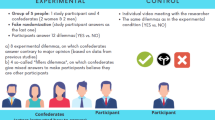Abstract
Two approaches for educating college students about the need for organ donors were compared. The experimental group (N = 162) watched a videotaped dramatization of an organ procurement coordinator asking the family members of a recently deceased loved one if they would donate their loved one's organs. Contained in this videotape was demographic information about three adults who needed an organ transplant. The control group (N = 169) saw the same videotape minus the demographic information. Extrapolating from research on altruism, we hypothesized that information about potential organ recipients would increase the viewer's willingness to donate a next-of-kin's organs and their own willingness to become an organ donor. Results supported this hypothesis. Compared to the control group, the experimental group was more willing to donate a next-of-kin's organs and take action to become an organ donor. We tentatively conclude that providing information about potential organ recipients increases the willingness of college students to become organ donors.
Similar content being viewed by others
REFERENCES
Batson, C., Duncan, B., Ackerman, P., Buckley, T., and Birch, K. (1981). Is empathic emotion a source of altruistic motivation? J. Pers. Soc. Psychol. 40: 290–302.
Conrad, S. (1998). Transplant Video Journal [Video: Spring 1998, No. 6].
Cosse, T., and Weisenberger, T. (2000). Words versus actions about organ donation:Afour-year study of attitudes and self-reported behavior. J. Bus. Res. 50: 297–303.
Cosse, T., Weisenberger, T., and Taylor, G. (1997). Walking the walk: Behavior shifts to match attitudes toward organ donation. Richmond, VA, 1994‐1996. Transplant. Proc. 29: 3248.
Dialysis Clinic Incorporated (1992). Get With It: Teen Perspectives on Organ Donation, DCI Video, Nashville, TN.
Gallup Organization (1993). The American public's attitude toward organ donation and transplantation: A Gallup survey for the partnership for organ donation, Feb., 1993.
Horton, R., and Horton, R. (1990). Knowledge regarding organ donation: Identifying and overcoming barriers to organ donation. Soc. Sci. Med. 31: 791–300.
Horton, R. and Horton, R. (1991). A model of willingness to become a potential organ donor. Soc. Sci. Med. 33: 1037–1054.
Martinelli, A. (1993). Organ donation: Barriers, religious aspects. AORD J. 58: 236–252.
McNatt, G. (1992). Testimony: Controversies in organ donation. ANNA J., 19: 341–354.
Morris, J., Wilcox, T., and Frist, W. (1992). Pediatric organ donation. The paradox of organ shortage despite the remarkable willingness of families to donate. Pediatrics 89: 411–415.
Parisi, N., and Katz, I. (1986). Attitudes toward posthumous organ donation and commitment to donate. Health Psychol. 6: 565–580.
Radecki, C., and Jaccard, J. (1997). Psychological aspects of organ donation. A critical review and synthesis of individual and next-of-kin donation decisions. Health Psychol. 16: 183–195.
Sanner, M. (2001) Exchanging spare parts or becoming a new person? People's attitudes toward receiving and donating organs. Soc. Sci. Med. 52: 1491–1499.
Schaller, M., and Cialdini, R. (1988). The economics of empathic helping: Support for a mood management motive. J. Exp. Soc. Psychol. 24: 163–181.
Slapak, M. (1997). Organ donation: Transplant Games, The “Island Effect” and other successful methods. Transplant. Proc. 29: 3047–3049.
United Network for Organ Sharing (2000). Annual Report of the U.S. Scientific Registry for Transplant Recipients and the Organ Procurement and Transplantation Network: Transplant Data: 1990‐1999,U.S. Department of Health and Human Services, Health Resources and Services Administration, Office of Special Programs, Division of Transplantation, Rockville, MD.
Wolf, J., Servino, E., and Nathan, H. (1997). National strategy to develop public acceptance of organ and tissue donation. Transplant. Proc. 29: 1477–1478.
Author information
Authors and Affiliations
Rights and permissions
About this article
Cite this article
Singh, M., Katz, R.C., Beauchamp, K. et al. Effects of Anonymous Information About Potential Organ Transplant Recipients on Attitudes Toward Organ Transplantation and the Willingness to Donate Organs. J Behav Med 25, 469–476 (2002). https://doi.org/10.1023/A:1020471007837
Issue Date:
DOI: https://doi.org/10.1023/A:1020471007837




